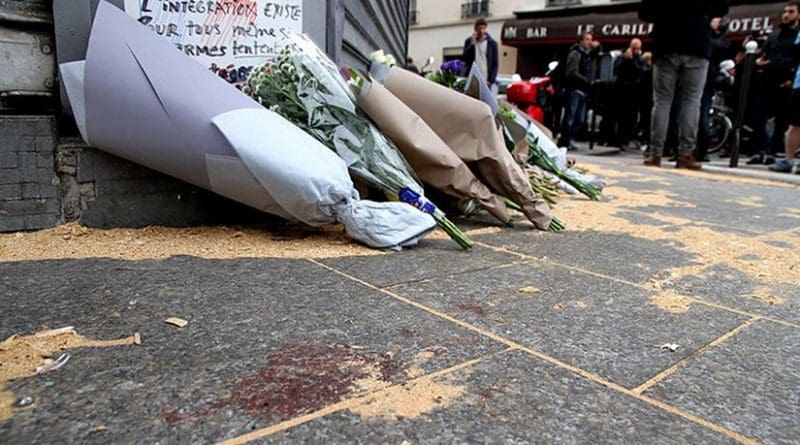Syria For Dummies – OpEd
By EurActiv
By Joel Schalit*
(EurActiv) — “Were they expecting flowers? We’ve been at war for seventy years.” This is the sort of bitter quip Israelis are wont to utter, so I shelved the words of my ninety-two year old cousin Hannah aside the past few weeks.
Until, that is, the first reports of the attacks in Paris reached me last Friday, when an Israeli friend posted on Facebook that she’d taken cover at Le Stade, and was unscathed. Home in Tel Aviv to see my family, the ‘Knife Intifada’ had just begun, and dinner conversation inevitably drifted to the matsav, or ‘situation’.
The advent of suicide stabbings, as the practice became dubbed in the press, had taken Israelis completely by surprise. A lifelong leftist who had grown up in Mandate Palestine, Hannah has always criticised Israelis for being myopic.
Back home in Berlin, I watched the coverage of the attacks on TV, feeling a profound sense of déjà vu. The commentary being offered, by politicians, by the news media, exuded shock, as though there was no way the violence could have ever been anticipated.
Not just the brutality of what had transpired, but the audacity of the militants responsible.
But why the surprise? Blowback of this sort was inevitable, especially following France’s decision to join the US-led campaign against ISIS on 26 September. The downing of a Russian airliner, in response to Moscow’s decision to join the war in Syria, at the end of October, should have been taken more seriously. Not just by the Russians, but by everyone fighting ISIS.
Clearly, the Islamist organisation was capable of holding its opponents accountable, despite the massive amount of firepower directed at it. ISIS may not be able to hold territory indefinitely, but can still instill fear in its better-equipped opponents, forcing them to undergo deep political crises, questioning the diverse makeup of their societies, and their democratic mores.
Yet, despite France’s involvement in anti-jihadist military operations since 9/11, deploying ground forces in Afghanistan from 2001 to 2012, bombing Libya in 2011, followed by deployments to Mali and the Sahel starting in 2012, Islamist terror in France still appears to come out of nowhere.
It may not be justifiable, but one cannot ignore its context, either.
That’s not even touching on France’s colonial history in the Middle East, and its relevance to contemporary politics in the region. In June 2014, ISIS singled out the Sykes-Picot agreement, declaring it dead, on the basis of its drive to reunite Syria and Iraq, under its caliphate. Agreed on by Britain and France in 1916, the treaty helped place Syria under French control, until 1946.
France’s occupation of the country was anything but benign, putting down two nationalist revolts, with aspirations to constitute a Greater Syria not too dissimilar, in terms of its grandeur, from what ISIS imagines itself entitled to today. It may seem rhetorical to those unfamiliar with Europe’s role in Middle Eastern history. But to not take its implications for France seriously is to ignore the central role that France obviously plays in ISIS military planning today.
That isn’t meant to suggest that France’s strategic worth, as a fragile, multiethnic state, hosting the largest Muslim population in Europe, isn’t important. As has been exhaustively reported in the press, there are a lot of vulnerabilities for militants to exploit, particularly the post-colonial inequalities that afflict France’s North African community.
But this is different. Though carried out by European Muslims, the Paris attacks were directed from abroad, by a foreign military organisation eager to strike back at France, as a consequence of a war France is participating in, in the Middle East.
That doesn’t mean that France deserves what it got. But what it does mean is that given the violence it has endured this year, French society should have been better prepared to gird itself for what it is going through now.
Hence, the usefulness of the Israeli example. Since the beginning of the Knife Intifada, our political echelon has been fond of pointing out how the Palestinians’ violence, with their reliance on simple kitchen knives, instead of guns, exemplifies the savagery of their culture, and the racism of their religion, as though there is no history behind such desperation. Destabilised and fearful, we buy into the narrative, because the situation is so terrifying, and brutal.
The War on Terror has introduced a similar dynamic in Europe, building up a continent-sized narrative of denial over the past fourteen years. Nevertheless, the longer Europe remains at war in the Middle East, the more difficult it will be to avoid understanding what happened in Paris last week. Blaming it on Salafist Islam, and hateful Imams, avoids the discussion that needs to be had. Europe has only itself to blame for the consequences of its unpreparedness.
*Joel Schalit is the News Editor of EurActiv.com. His books include Israel vs. Utopia, and Jerusalem Calling: A Homeless Conscience in a Post-Everything World.

